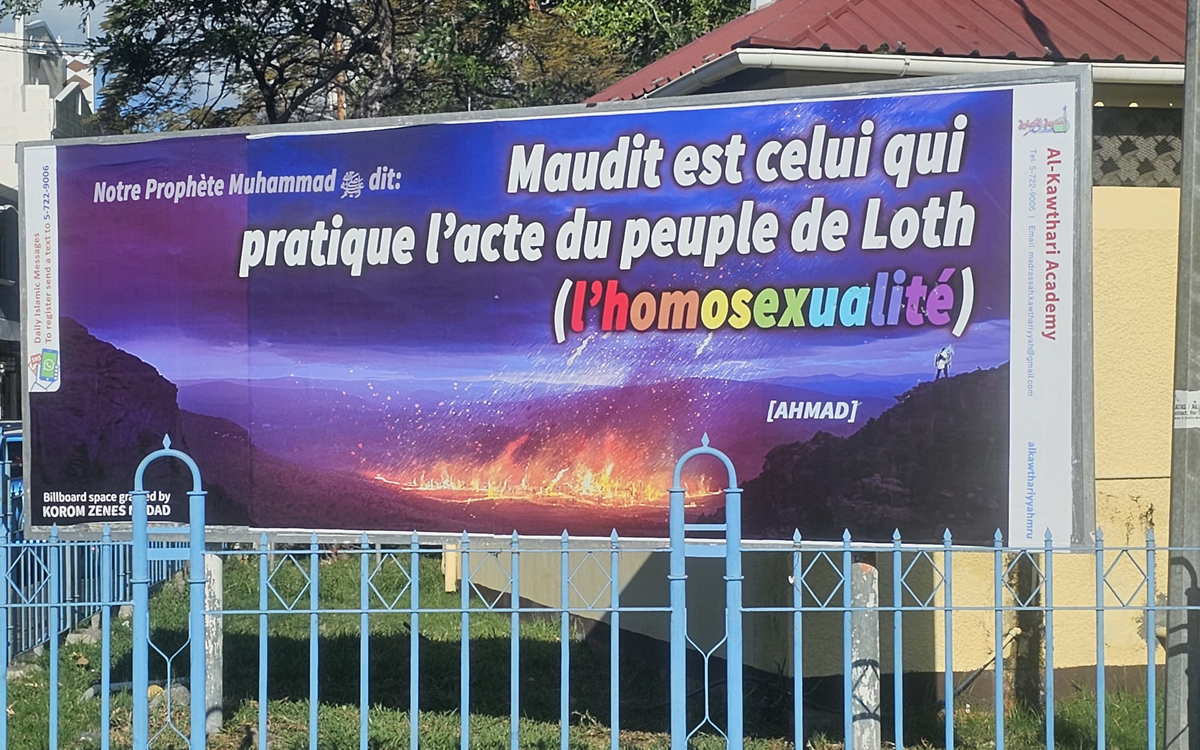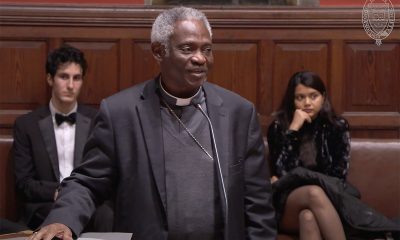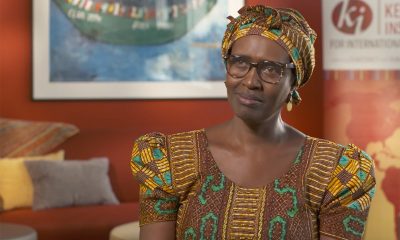Africa
LGBTQ, intersex community in Mauritius growing more visible
Homosexuality remains criminalized in African country

Mauritius is seeing a positive trend when it comes to the LGBTQ and intersex community, even though consensual same-sex sexual relations remain criminalized.
Young Queer Alliance, an LGBTQ and intersex rights group in the southern African country, on July 7 released findings of the research it conducted in 2022. Its work indicates attitudes towards LGBTQ and intersex people in Mauritius have improved from where they were five years ago.
The number of LGBTQ and intersex couples living together has doubled from 5.6 percent in 2017 to 11 percent in 2022. Nearly 63 percent of those who identified as LGBTQ or intersex came out to a sibling in 2022, compared to 53.5 percent in 2017. The percentage also increased when it came to coming out to parents or guardians — from 29 percent in 2017 to 41.7 percent in 2022.
Young Queer Alliance, however, said although these were positive results, the LGBTQ and intersex community was still facing brazen attacks and stigma from religious sects and other segments of Mauritian society.
Young Queer Alliance noted religious bodies should become voices for the LGBTQ and intersex community by offering them protection and refuge as their connections to themselves and their faith remain personal, unshakable and sacred.
Young Queer Alliance painted a grim picture when it comes to tolerance of LGBTQ and intersex people in Mauritius, especially in the workplace.
“61.5 percent of LGBTQ+ people reported that they have been victims of discrimination at their workplace. However, we regularly sensitize and empower LGBTQ+ persons on their rights including employment rights,” said Young Queer Alliance. “Some 102 employees in five private sector companies have been sensitized on the diversity and inclusion of LGBTQ+ people in the workplace. Moreover, as and when there are complaints of workplace discrimination based on sexual orientation, YQA approaches the Ministry of Labor or the Equal Opportunities Commission for a resolution.”
Young Queer Alliance also said there was very little possibility that consensual same-sex sexual relations will be legalized anytime soon.
“Unfortunately, the current government was elected with only 38 percent of national votes representing less than 30 percent of all eligible voters,” said Young Queer Alliance. “Politics is closely linked with socio-cultural and religious groups. Government has made it clear that it would not decriminalize sodomy given the social fabric. Nevertheless, members of the opposition are more supportive of LGBTQ+ rights.”
Young Queer Alliance said it is heart breaking to see LGBTQ and intersex people flee the country and leave their families for asylum in other countries where they can be themselves and freely express their sexual identity.
An anti-LGBTQ billboard that said “cursed is he who practices the deed of the people of Lot (homosexuality) was erected in Port Louis, the Mauritian capital, a few days ago. Collectif Arc-en-Ciel, a local LGBTQ and intersex rights group, said Muslim extremists erected it.
“We respect all point of view and the freedom of expression, nonetheless it is rather deplotable that in 2023 such a statement can be published without the authorities responding whilst it clearly can be termed as hate speech towards the LGBTQIA+ community,” said Collectif Arc-en-Ciel Director Jean Daniel Wong.
Any person found guilty of the crime of sodomy or bestiality under Mauritian law shall be liable to penal faces up to five years in prison.
More than 400 people participated in Collectif Arc-en-Ciel’s annual Pride parade, which local authorities deemed illegal. Police did not arrest any of them, but they did face death threats.
Africa
LGBTQ activists in Africa work to counter influence of American evangelicals
Lawmakers continue their crackdown on queer rights

American far-right evangelical organizations fund African MPs and religious groups and support their advocacy efforts against homosexuality.
The support for the two influential groups on the continent has contributed to increased homophobic rhetoric for conservative family values through religious teachings and public policy. Open for Business, a coalition of leading global organizations that champion LGBTQ inclusion, revealed this trend in its latest report that surveyed the East African countries of Kenya, Uganda, Tanzania, and Rwanda.
“The anti-LGBTQ+ agenda driven by Christian groups in Kenya and Uganda has received significant funding and support from foreign anti-rights groups, particularly from U.S. far-right evangelical organizations,” the report states.
The two nations, along with Tanzania, have had heightened curtailing of queer rights in recent years through legislation and religious protests. Homosexuality remains criminalized in the three countries, with varied jail terms of not less than 10 years.
“There is much misinformation and disinformation being circulated in Kenya about LGBTQ+ issues — churches are behind much of this, and they leverage selective interpretations of religious teachings to stir up anti-rights sentiments,” the report reads.
It adds religious groups have attained greater influence with their homophobic campaigns under President William Ruto, who is Kenya’s first evangelical Christian head of state.
The American far-right evangelical churches are part of the New York-based World Evangelical Alliance, whose global believers are considered “incredibly diverse and vibrant people of faith.”
“They are bound together by spiritual convictions that they consider ‘non-negotiable’ while acknowledging a wide variety of expressions in non-essential matters such as their style of worship,” the Rev. Leon Morris, the founder member and former chairman of Evangelical Alliance of Victoria, states on WEA’s website.
The religious groups under the Kenya Christian Forum, in partnership with Linda Uhai Consortium (or Protect Life in Swahili) composed of pro-life organizations, late last month held their annual march in Nairobi, the country’s capital. Opposition to LGBTQ rights was among the agenda items.
Some anti-homosexuality placards that march participants held read, “Homosexuality is abnormal,” “Rainbow belongs to God,” “No to Western cultural imperialism, yes to family values,” and “In the beginning God made them; male and female.” The organizers also criticized the Kenyan courts over their recent rulings in favor of the queer community, such as allowing the National Gay and Lesbian Human Rights Commission to register as a non-governmental organization.
The African Inter-Parliamentary Conference on Family Values and Sovereignty is a caucus of African MPs that American far-right evangelical organizations support to drive anti-LGBTQ policies in their countries.
The group held its second conference in Entebbe, Uganda, last May. The definition of sex and sexuality and their impact on LGBTQ issues were among the topics that delegates from more than 20 countries discussed.
The three-day conference that Ugandan Parliament Speaker Anitah Among and Henk Jan Van Scothorst, director of the Christian Council International, sought to curb homosexuality. The delegates also resolved to have the African Caribbean Pacific and European Union Economic Partnership, also known as the Samoa agreement, reviewed for undermining the sovereignty of African governments over LGBTQ rights and related “human rights” issues.
The far-left government officials and queer lobby groups from the U.K. and other Western countries, meanwhile, are engaging with LGBTQ activists in Africa to counter American evangelical organizations’ anti-homosexuality campaigns.
British officials, led by Equalities Minister Nia Griffith, in February met with Sexual Minorities Uganda Executive Director Frank Mugisha and Erick Mundia, a senior policy advisor for Ipas Africa Alliance, a Kenya-based abortion rights advocacy group.
“As part of our Queering Atrocity Prevention program, which seeks to center LGBTQI+ rights and risks as part of atrocity prevention and wider peace and security, our team held a parliamentary roundtable exploring the implications of transnational far-right organizing for global LGBTQI+ rights and how the UK parliament can respond,” the statement reads.
Klara Wertheim, head of global programs at Stonewall, and Farida Mostafa, queering atrocity prevention manager of Protection Approaches, were among the other representatives of queer rights organizations who participated in the roundtable with highlighted “the implications of transitional far-right activity for global LGBTQI+ rights.”
“Discussions with MPs, Lords, parliamentary staff and civil society representatives centered on tactics used by far-right actors to disrupt democratic rights-based systems,” reads the statement. “The impacts of these malign efforts on sexual and gender-based rights in the UK and abroad, and how parliamentary actors can contribute to stemming these trends in their parliamentary work.”
Cameroon
Cameroonian LGBTQ activist shares journey of resilience, healing, and authenticity
Bandy Kiki recently married her Nigerian partner

Bandy Kiki, a Cameroonian LGBTQ activist and media personality who currently lives in the U.K., has married Jenny, her Nigerian partner.
Kiki, who came out as gay in 2017, said in a March 25 post that she had become “Ijaw by marriage.”
Ijaw is a tribe in Nigeria from where Jenny originates.
“For many people, celebrating love is expected, even assumed. But for those of us in the LGBTQ+ community, it is often questioned, as though our love needs justification,” Kiki told the Washington Blade in an exclusive interview.
And hers has been a journey of resilience, healing, and authenticity.
In this exclusive interview, Kiki shares her story as a gay person growing up in a Cameroonian society that considered, and still considers gay relationships as fundamentally flawed, and patently sinful.
“Facing societal perceptions and expectations required both resilience and self-discovery,” she said.
“In the beginning, it felt like I was constantly being asked to justify my identity, my relationship, and even my joy. There were moments of doubt, isolation, and deep frustration,” Kiki told the Blade.
“Over time, I have grown more confident in who I am. I have found community, chosen family, and a sense of self that no longer depends on anyone else’s approval.”
Here are some excerpts of the conversation.
BLADE: What inspired you to take this step and celebrate your love openly, despite the prevalent social and cultural stigmas about gays in your country of origin, Cameroon?
KIKI: When I was asked why I chose to celebrate my love openly, I couldn’t help but wonder: Would I be asked that if I weren’t queer? For many people, celebrating love is expected, even assumed. But for those of us in the LGBTQ+ community, it is often questioned, as though our love needs justification.
Coming from a culture where being LGBTQ+ is still heavily stigmatized, I spent a long time feeling like I had to hide or shrink parts of myself just to be accepted. That is why marrying my partner is not just about legal rights. It is about joy, truth, and visibility. It is about showing that our love is just as real, just as deserving, and just as worth celebrating as anyone else’s. It is about healing and choosing courage over fear.
BLADE: What does this marriage mean to you personally and culturally?
KIKI: Marriage is a fundamental human right for everyone of marriageable age, regardless of their sexuality. It is not just a legal bond but the quiet vow to grow old with someone, not by the accident of time but by choice, every day. Culturally, I see marriage as the coming together of families or the beginning of one.
BLADE: How did your love story with your partner begin?
KIKI: Our love story began in the most modern way. We met online. I was not expecting much, but from our very first conversation, something just felt easy. She quickly picked up on one thing about me. I talk about food a lot. I mean, a lot. Especially about how much I had been craving Waakye, one of my favorite Ghanaian meals.
Immediately after our first date at a restaurant, which went incredibly well, she asked me to come to her house for a surprise. Naturally, my mind wandered to certain possibilities. But when I got there, she brought out a big bag filled with takeaway bowls of Waakye she had ordered, just because I had mentioned it in passing.
In that moment, I knew this was something special. This was not just about food. It was about being heard. It was about someone who listened to what I said and cared enough to remember it. That simple gesture told me everything. She paid attention. She took action. She showed love not just in words but in thoughtful details.
That was the moment she had my full attention. And honestly, she has had it ever since.
BLADE: Describe your life at home?
KIKI: We are both women, and our marriage does not operate on traditional gender roles. There is no “husband” or “wife” in lesbian relationships, regardless of how either partner presents herself in terms of fashion or style. In our marriage, we are equal partners who show up for each other in the ways that feel right for us. I love food and I am the better cook, so I do the cooking. My wife handles the cleaning, which works perfectly because I genuinely dislike it.
BLADE: At what point in your life did it occur to you that you were more inclined to same-sex relationships, and given Cameroon’s aversion to homosexuality, how did you manage to date fellow women in those early days, and can you speak to some of the experiences you had?
KIKI: In my teens, when friends were thinking about boys, I was thinking about girls. When I finally had the courage to seek love, it was all about “understanding and response.” I would do nice things for them, hoping they would see me as more than just a friend and maybe even feel the same way about me. That way, there was always deniability if they wanted to out me. It cost me a lot in time, energy, and emotion, but in an environment like Cameroon, queer people develop different tools to cope. For the safety of those back home, I will not go into more or other details.
BLADE: How has your journey been in navigating societal perceptions and expectations?
KIKI: Honestly, it was incredibly challenging, especially right after I came out. But it has also been completely worth it. Staying in the closet might have been easier, but it would have cost me my mental health and the chance to live my truth.
Facing societal perceptions and expectations required both resilience and self-discovery. In the beginning, it felt like I was constantly being asked to justify my identity, my relationship, and even my joy. There were moments of doubt, isolation, and deep frustration.
Over time, I have grown more confident in who I am. I have found community, chosen family, and a sense of self that no longer depends on anyone else’s approval. I now accept that not everyone will understand my path, and that is okay. What matters most is that I do.
BLADE: How do you hope your story will impact others in similar situations?
KIKI: I hope my story offers comfort to those who feel alone or unseen. I want others in similar situations to know that their feelings are valid and that they are not the only ones navigating this journey. Even in difficult environments, there is strength in quiet resilience and there is hope in knowing that being true to yourself, even in small ways, is powerful. If someone can see themselves in my story and feel a little more understood, then sharing it will have been worth it.
BLADE: What advice would you give to individuals who may be struggling with acceptance or self-expression?
KIKI: Take your time. Your safety and well-being matter just as much as your truth. Self-acceptance is not a race. It is a process, and it is okay to go at your own pace. Seek out safe spaces, even if they are few and far between, and surround yourself with people who see and respect you. When you are ready, express yourself in ways that feel right for you, no matter how small. There is no one way to be you, and there is no shame in surviving.
Killian Ngala is a freelance journalist in Yaoundé, Cameroon.
South Africa
US-funded South African LGBTQ groups curtail operations
Suspension of most American foreign aid jeopardizes HIV prevention efforts

Two South African prominent LGBTQ organizations have become the latest victims President Donald Trump’s executive order that froze most U.S. foreign aid that the U.S. Agency for International Development disbursed.
Prior to the executive order, USAID had been playing a pivotal role in enhancing the rights of the LGBTQ community in South Africa through financial incentives. Since the executive order, many LGBTQ organizations have been struggling to remain afloat and provide services.
OUT LGBT Well-being on March 31 announced the closure of its Engage Men’s Health program.
The program offered stigma-free HIV and related health services through the President’s Emergency Plan for AIDS Relief, which USAID and the Centers for Disease Control and Prevention funded.
“For over a decade, OUT has been privileged to receive support through PEPFAR. In recent years, we proudly became the first local community organization to successfully graduate to direct recipient status of this funding from USAID. We are deeply grateful to the American people for their years of support,” sand OUT LGBT Well-being Executive Director Dawie Nel. “However, we regret the sudden and devastating impact of this funding withdrawal, not just on us, but on the thousands of individuals whose health and well-being depended on these services.”
Nel said Engage Men’s Health had managed to help 2,000 men who have sex with men stay on life-saving antiretroviral therapy, and provided 4,000 others with PrEP to prevent HIV infection.
“With these services now ending, we fear that HIV will spread more rapidly and that many will struggle to access the care they need,” added Nel. “While this marks the end of Engage Men’s Health, OUT LGBT Well-being will remain open. In the coming months, we will refocus our work and explore new ways to continue serving our community.”
Motlatsi Mkalala, board chair of Access Chapter 2, said USAID’s dismantlement has caused irreparable damage, which prompted the organization to close some of its branches and layoff some of its employees.
“As of the 1st of April 2025, operations across our various offices in the provinces of the Eastern Cape, Free State, Northwest, and Mpumalanga ceased,” said Mkalala. “The limited services at the headquarters in Pretoria will continue to run, but by a very small team.”
Emma Louise Powell, a South African MP and the Democratic Alliance party’s national spokesperson on international relations and co-operation, said PEPFAR since 2003 has played a transformative role in South Africa’s fight against HIV/AIDS, saving millions of lives and bolstering the country’s public health infrastructure. Powell said the cuts will prove disastrous.
“Given the critical nature of this life saving treatment, both government departments and non-profit organizations dependent on PEPFAR and related USAID funding across South Africa need more time to prepare for any potential phase-out of long-standing HIV/AIDS resourcing,” said Powell. “We call upon the secretary of state, Marco Rubio, and relevant policymakers to swiftly reinstate funding.”
Iranti spokesperson Mogau Makitla said Trump’s executive order is going to lead to the closure of many LGBTQ organizations. Makitla called upon the South African government to immediately step in and fill the funding void.
“South Africa has one of the highest rates of HIV/AIDS, whilst the government has made significant strides towards ending the pandemic, we anticipate that the closure of the aforementioned facilities will subsequently result in an increase in the spread of HIV/AIDS due to the decrease in management and mitigation services,” said Makitla. “Gender-affirming healthcare services, which have always been limited are also under threat as a result of the halt.”
-

 State Department5 days ago
State Department5 days agoHIV/AIDS activists protest at State Department, demand full PEPFAR funding restoration
-

 District of Columbia5 days ago
District of Columbia5 days agoCapital Pride wins $900,000 D.C. grant to support WorldPride
-

 Obituary4 days ago
Obituary4 days agoLocal attorney, LGBTQ rights advocate Dale Sanders dies at 75
-

 U.S. Federal Courts3 days ago
U.S. Federal Courts3 days agoFederal judge blocks Trump passport executive order












